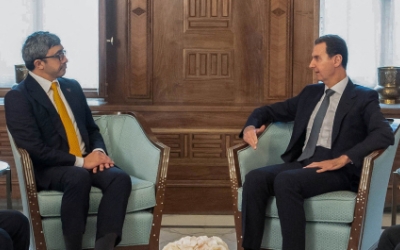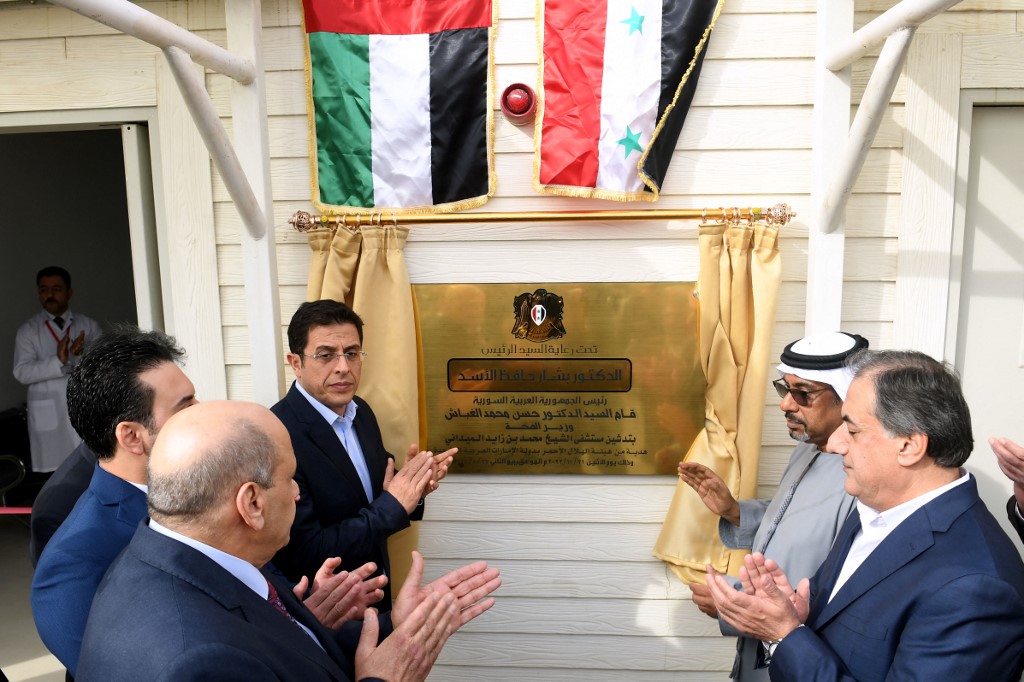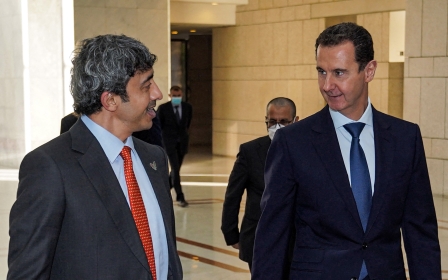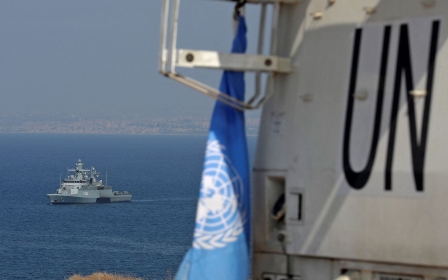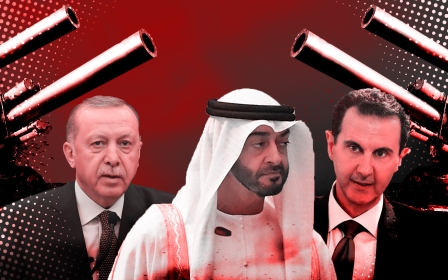Why the UAE is playing long game on Syria
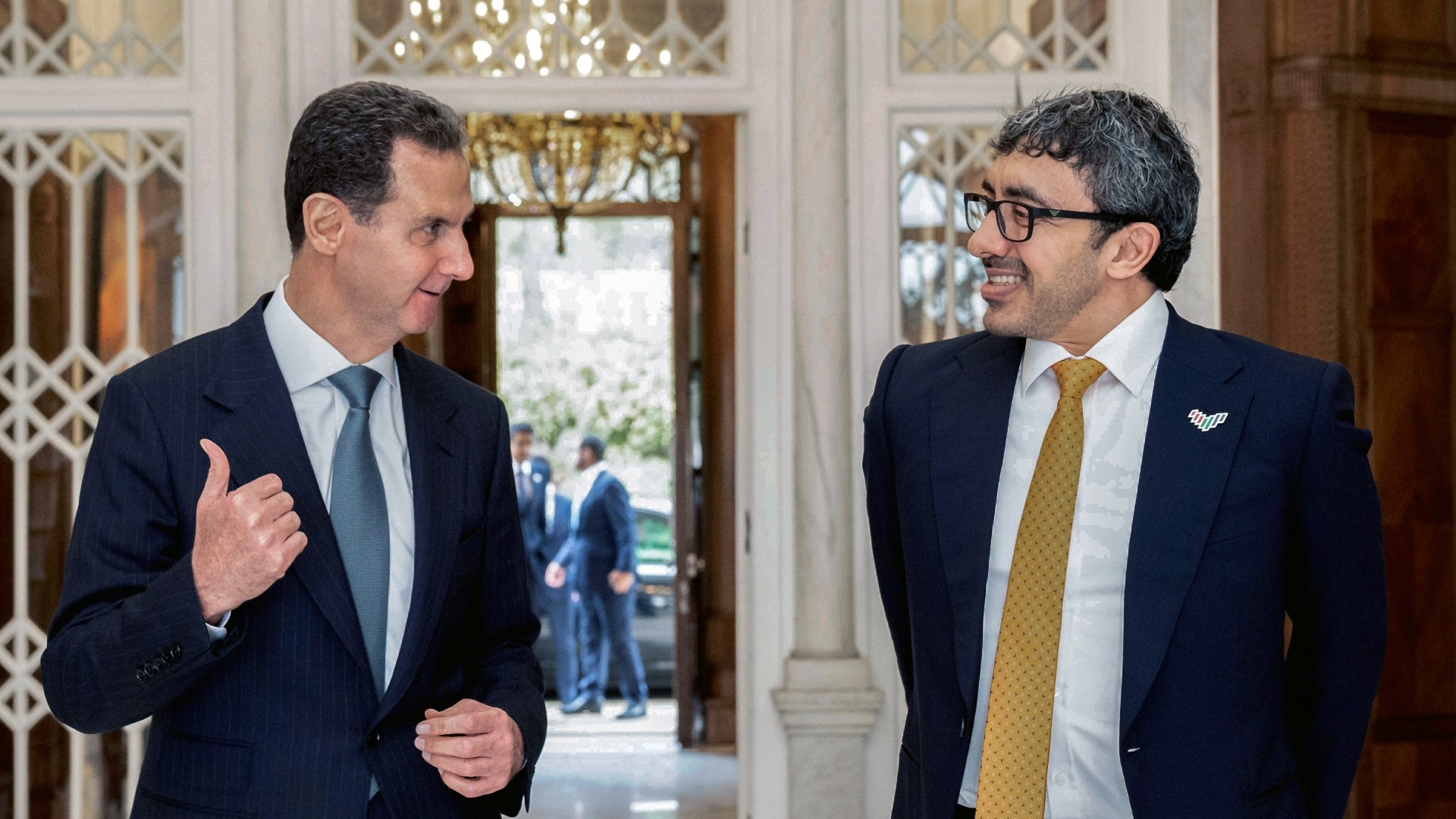
In a tweet on 6 January 2023, US Senator Jim Risch warned the United Arab Emirates about further engaging with Syria’s Assad government - just one day after UAE Foreign Minister Abdullah bin Zayed had been on his second visit to Damascus to meet with President Bashar al-Assad.
As a senator sitting on the US Senate Committee on Foreign Relations, Risch should be aware that with the Caesar Syria Civilian Protection Act (Caesar Sanctions), Washington has one of the most powerful tools at its disposal to keep partners and allies in line when it comes to normalising relations with Damascus.
Abu Dhabi tries to use relations with Damascus as a bargaining chip to boost its own standing as a regional middle power
Instead of just being a passive onlooker in Syria, the United States still has significant leverage over Arab partners - if it chooses to use it.
For Abu Dhabi, Syria is a network-building asset. It tries to use relations with Damascus as a bargaining chip to boost its own standing as a regional middle power.
While it would be wrong to say that there is no love lost between the two authoritarian counterrevolutionary players, it is important to highlight that Assad is a mere tool to be leveraged by the Emiratis to position itself as the leading Arab broker in post-revolutionary Syria.
New MEE newsletter: Jerusalem Dispatch
Sign up to get the latest insights and analysis on Israel-Palestine, alongside Turkey Unpacked and other MEE newsletters
The Gulf state’s network-centric statecraft relies on developing and ripening complex and clandestine networks across all domains that are all tied directly or indirectly into the strategic decision-making apparatus in Abu Dhabi - networks that make the UAE a key node of regional influence.
Syria provided an interesting opportunity to the Gulf monarchy as the tables began to turn in favour of the globally ostracised Assad government.
While other Gulf states such as Saudi Arabia and Qatar had been at the forefront of arming rebels fighting against Damascus, Assad’s counterrevolution is testimony to the resilience of his government that, with the support of Russia and Iran, has been able to cling on to power.
Strategic vacuum
Abu Dhabi exploited the strategic vacuum to offer a supporting hand to Damascus at a time when its regional competitor Iran appeared to be making headway in the Arab Levant. More than that, the emirate has found an ideological ally in Assad who, like the UAE's ruler, President Mohammed bin Zayed Al Nahyan (MBZ), has been on a counterrevolutionary crusade against Islamism.
It was not surprising, therefore, that the UAE decided in 2018 to reopen its embassy in Damascus. Very quickly, Emirati networks were reactivated, particularly in the financial and trade domains.
For years, key Damascus proxies had maintained close relations with the UAE as a safe haven for their illicit monies - many of whom appeared at the UAE-Syria Investment Forum hosted by Abu Dhabi in January 2019.
And bilateral trade started to grow as Syrian businessmen and companies were able to use Dubai’s position as a financial hub to access global markets. Some were even designated by the US Treasury for trying to evade sanctions, such as Samer Foz’s UAE-based ASM International Trading.
On the strategic level, Abu Dhabi rebooted its security ties with Damascus, providing Syrian intelligence officers with training courses in the UAE. Some go as far as to allege that MBZ offered Assad $3bn in 2020 to tie down Turkey in a military confrontation in Syria - a plan that was disrupted by Russia.
All this overt, strategic engagement between Abu Dhabi and Damascus came to an end with the Trump administration implementing the Caesar Sanctions in June 2020, putting the Emirates on the spot.
Although first complaining about the sanctions, the Emirates shifted their Syria engagement to the grey zone exploiting the sanction regime’s humanitarian exceptions. The UAE Red Crescent opened field hospitals in Aleppo and the Damascus area. It used Covid diplomacy to provide Syria with vaccines and pandemic support in 2021 - measures provided in areas where the sanctions did not bite but that allowed Abu Dhabi to buy credit in Damascus.
Gateway to Damascus
Since then, the UAE’s engagement with the Assad government has been more narrative than action. Talks about the UAE becoming “Syria’s most prominent global trade partner” are intended to shape the perception on an international level of Abu Dhabi as being the gateway to Damascus.
Assad’s photo op in Abu Dhabi in March 2022 served the same purpose: again, the UAE appears to hold the keys to re-engagement with Damascus. Even the announcement of a 300-megawatt solar power plant being built by a consortium of Emirati firms in southern Syria will remain a project on the drawing board as long as US sanctions remain in place.
And this is a case in point. It demonstrates that Washington still holds considerable power in Syria, especially as far as allies and partners are concerned. The potency of the dollar as a sanctions weapon allows the US to determine the limits of any Assad engagement - even for the UAE’s often informal, clandestine networks.
The US Treasury has taken action time and again against entities and individuals suspected of violating sanctions in Syria - some with links to the UAE. There is also no doubt that Washington would take action against Abu Dhabi if it was in breach.
US exit strategy
The issue for the United States, however, is the absence of a clearly defined Syria policy. Some US institutions recognise the growing dissonance between America’s no-Assad policy and the reality on the ground that indicates the dictator is going to stay.
If the US wanted to dissuade its partners in the UAE from engaging with Assad, it could make its sanctions bite
The waiver by the Biden administration to trade energy from Jordan over Syria to Lebanon, allowing Damascus to make tens of millions of dollars in revenue, suggests that Washington is softening its stance on Assad and looking for an exit strategy in Syria.
Hence, a change of US direction on Syria might just be a matter of time - at which point the UAE networks are ready to implement and execute putting Abu Dhabi at the heart of post-conflict reconstruction.
If the US wanted to dissuade its partners in the UAE from engaging with Assad, it could make its sanctions bite its allies. More importantly, though, Washington would have to make up its mind about where it wants the region to go regarding a regime responsible for over a half million dead.
So far, the UAE appears to be bandwagoning along an ever-vaguer US policy stance on Syria, seeking loopholes and opportunities to bring Assad back into the fold.
The views expressed in this article belong to the author and do not necessarily reflect the editorial policy of Middle East Eye.
This article is available in French on Middle East Eye French edition.
Middle East Eye delivers independent and unrivalled coverage and analysis of the Middle East, North Africa and beyond. To learn more about republishing this content and the associated fees, please fill out this form. More about MEE can be found here.



